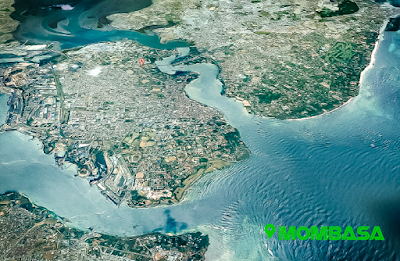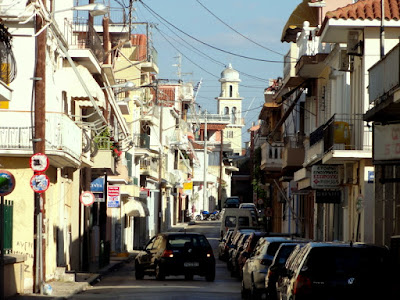 |
| Mombasa 1572 by Georg Braun and Franz Hogenberg |
In my post "Home Leave 1956" of the 6th April 1956, I had mentioned that our leave was coming to an end and that we should not be returning to Karachi, which we loved, but to Mombasa, Kenya, where we had been transferred by Ralli Brothers.
Here is a short account of Kenyan history. The territory that is now known as Kenya, was inhabited since the beginning of the Early Paleolithic Age. The Portuguese and Arab presence in Mombasa dates from the Middle Ages to the Early Modern Period, but European exploration of the interior of the country began, only, during the 19th century.
The British established the East African Protectorate of Kenya in 1895 and from 1920 it is known the British Colony of Kenya. The Independent Republic of Kenya was formed in 1964.
In early September 1956, we bid tearful (on my part) farewells to our family and friends in Athens and boarded a BOAC aircraft for Kenya. The 1950s and the 1960s were later known as the "golden ages of flying", so we enjoyed, large comfortable seats with ample leg space and fabulous gourmet meals.
After 10 -12 hours, we arrived at Eastleigh Airport, near Nairobi. My first impression was the colour of the runway, which consisted of compact murram, the red East African soil.
We were warmly welcomed by old friends, an English couple, we had known from Pakistan, who were now, with Ralli Brothers East Africa. We had a wonderful day with them, fondly reminiscing events and situations that we had shared in the not so distant past.
The next day, we boarded a British East African plane that took us to our destination, Mombasa. It is actually built on a coral island, inclosed in a gulf, on the Indian Ocean, and is, therefore, an important port.
Mr D.G, Sevastopoulos and his charming wife Betty, were there to meet us and took us over to their house for a huge breakfast and, then, to a lovely small bungalow, on Mbuyuni Road, which the company provided for us, fully furnished, with a cook and bearer.
Our little Fiat 500, which we had bought the previous summer from Turin, was shipped over and we were delighted to have it with us as we considered it a member of the family.
The garden was quite large with beautiful tropical trees and shrubs, but the earth was just a layer of red East African soil covering a coral substructure. This was a great challenge for my husband Aleco, who had the prospects of a keen gardener.
He first cleared the area with a shovel, getting rid of the weeds, loose rocks and roots. He bought dark soil enriched with fertiliser, a thick layer of which was spread all over the murram, He raked the soil and levelled it, making a slope away from the house. He then sowed "Kikuyu warm-season grass seed" in a crisscross pattern all over and covered them all over with extra soil to protect them from the birds. Aleco sprinkled the seeds with water, 2-3 times a day, for the first 10 days. So very soon, we had a lush, green lawn which became our pride and joy. It was an enormously difficult but a gratifying task which was greatly admired.
After the first day in our new home, I woke up to the sounds of strange birds, which I had never heard before in Europe or Asia. There were melodic whistles, rather than twitters, while others were like continuous, staccato metallic coughs.
 |
| Arab Town |
 |
| Malindi Beach |
We loved Mombasa, a beautiful city with a medieval Arab town and lovely white sandy beaches, like Malindi beach which we visited every Sunday. As a coral reef protects the shore from the sharks, we went under-water fishing and caught white snappers, kingfish and stingrays that are very tasty either poached or grilled.
Once we went in a glass-bottomed boat to catch a glimpse of marine life such as various kinds of multicoloured tropical fish, coral, sea urchins and starfish.
We made life long friends with people of various nationalities. We had friends over for lunch and dinner, went to tremendous parties and as Mombasa was a busy port we were often invited aboard luxurious ships for cocktails and excellent food.
The Sevastopulos had two elder sons who were at school in England and a seven-year-old daughter called Marigo, a clever child with a terrific sense of humour. I wish to thank them for their support, especially Betty who helped me settling down. We went shopping together and she introduced me to many interesting women and gave me subtle advice about the house.
As Aleco and Mr Sevastopulo were both from the island of Chios, he showed us a book by Philip Argentis who had written about the history and displayed the family trees of twelve families from Chios.
D.G. Sevastopulo, besides being the manager of Ralli Brothers in Mombasa, was also a famous entomologist, specialising in moths and butterflies. He is the author of many books on this subject like "Interspecific Competition of Butterflies" and the "Genetics of East African Lepidoptera".
I am embarrassed with my fading memory trying to remember the name of a Greek couple, who had a chic boutique in Mombasa. We were very friendly and they had made a few very elegant dresses for me. Shame on me.
To our great joy, I was pregnant very soon after our arrival in Mombasa. I had an easy and very happy pregnancy and I had learned Dr Benjamin Spock's "Baby and Child Care" by heart.
Our son, Spiros Steven was born in the Mombasa European Hospital, on the 17th July. He was a beautiful baby and he certainly changed our lives. I had a feeling of great satisfaction and utter bliss and we both adored this tiny creature of ours.
My mother had come over for the great occasion, from Karachi where my father still worked. She stayed for a month with us and her help and advice were invaluable.
I had never thought about this before, but after Spiro was born, I realized how very much parents love their children. I had never before understood the strength of parental love and it was quite overwhelming. It made me think of my parents who were always loving, supporting and were always there when I needed help. I sincerely hoped that I should, also, be a good mother.
Our baby was growing with leaps and bounds, all smiles and dimples. He soon started crawling and climbing on sofas and armchairs all day long. So we had to run after him to prevent accidents. By the end of each day, I was so exhausted that I would suddenly collapse and fall fast asleep right next to him. We were blissfully happy and we could not imagine life without Spiro-Steven. He was all smiles and gurgles, splashed in his bath, enjoyed his meals but for the first three months, he cried painfully in the evenings. So we put him in his carrycot and went for a drive in the Cinquecento, which calmed him down and lulled him happily to sleep.
I met many women with small babies and we were amazed by the delight they felt in each others company, these tiny social entities!
At Chrismas, Spiro was five months old. So we bought a Christmas tree and decorated it with baubles and garlands and especially for him, flashing lights. Our cook Odiambo and I prepared a traditional Christmas meal with pumpkin soup, turkey, stuffing and glazed ham with all the trimmings and obviously, Christmas pudding with rum custard and cream.


















































